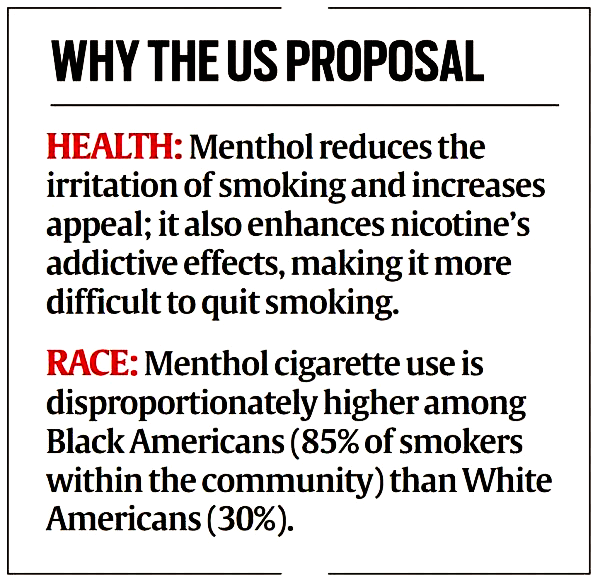Governance
Ban on Menthol Cigarettes and Flavored Cigars
- 30 Apr 2022
- 7 min read
For Prelims: Tobacco Consumption, WHO FCTC, Cigarettes and Other Tobacco Products Act (COTPA), 2003
For Mains: Scenario of tobacco consumption in India and its impacts
Why in News?
Recently, the US Food and Drug Administration issued a proposal to ban menthol cigarettes and flavored cigars.
- India has not banned the sale of menthol cigarettes.
- In 2012, Brazil became the first country in the world to ban menthol cigarettes.
- In 2019, the Centre banned electronic cigarettes and in addition, different states have their own rules in place banning hookah consumption, including flavored hookahs, in public places.
What is the Proposal?
- About:
- It aims to prohibit menthol as a characterizing flavor in cigarettes and prohibit all characterizing flavors (other than tobacco) in cigars.
- The proposed rules would help prevent children from becoming the next generation of smokers and help adult smokers quit.
- The proposed rules represent an important step to advance health equity by significantly reducing tobacco-related health disparities.
- The proposed ban does not cover electronic cigarettes.
- Penalty:
- The rules will not be enforced against individual consumers for possession or use of menthol cigarettes or flavored cigars.
- The rules will only “address manufacturers, distributors, wholesalers, importers and retailers who manufacture, distribute, or sell such products.
What are the Reasons behind the Ban?
- Health:
- Menthol, with its minty taste and aroma, “reduces the irritation and harshness of smoking.
- This increases appeal and makes menthol cigarettes easier to use, particularly for youth and young adults.
- Menthol also interacts with nicotine in the brain to enhance nicotine’s addictive effects, while making it more difficult for people to quit smoking.
- Menthol, with its minty taste and aroma, “reduces the irritation and harshness of smoking.
- Race:
- Menthol cigarette use is disproportionately higher among Black Americans (85% of smokers within the community) than White Americans (30%).
- The proposed ban will affect a large share of the smoker population, especially young adults and racially disadvantaged groups.
What is the Status of Tobacco Consumption in India?
- According to the Global Youth Tobacco Survey, India has the second largest number (268 million) of tobacco users in the world and of these 13 lakhs die every year from tobacco-related diseases.
- Ten lakh deaths are due to smoking, with over 2,00,000 due to second-hand smoke exposure, and over 35,000 are due to smokeless tobacco use.
- About 27 crore people above the age of 15 years and 8.5% of school-going children in the age group 13-15 years use tobacco in some form in India.
- India bears an annual economic burden of over Rs. 1,77,340 crores on account of tobacco use.
- Tobacco use is known to be a major risk factor for several non-communicable diseases such as cancer, cardiovascular disease, diabetes, and chronic lung diseases. Nearly 27% of all cancers in India are due to tobacco usage.
What will be the Impact of such Ban on India?
- If India were to ban menthol and other flavored cigarettes, the impact might be limited, given that chewing tobacco and bidi are the most common forms of tobacco use.
- As per the last available Global Adult Tobacco Survey (GATS 2016-17) — India has 26.7 crore tobacco users aged 15 and above, 18% of the population uses smokeless tobacco, 7% smoke, and 4% use both.
- Even among smokers, the impact of such a step would only be on young adults and women who are just starting to smoke.
- Banning products has logistical issues as well because banning will increase smuggling of the products.
- Currently, availability of various flavors has increased over the years.
What are the Related Initiatives of India?
- India:
- WHO FCTC:
- India adopted the tobacco control provisions under World Health Organization (WHO) Framework Convention on Tobacco Control (WHO FCTC).
- Cigarettes and Other Tobacco Products Act (COTPA), 2003:
- It replaced the Cigarettes Act of 1975 (largely limited to statutory warnings- ‘Cigarette Smoking is Injurious to Health’ to be displayed on cigarette packs and advertisements. It did not include non-cigarettes).
- The 2003 Act also included cigars, bidis, cheroots, pipe tobacco, hookah, chewing tobacco, pan masala, and gutka.
- Promulgation of the Prohibition of Electronic Cigarettes Ordinance, 2019:
- It prohibits Production, Manufacture, Import, Export, Transport, Sale, Distribution, Storage and Advertisement of e-Cigarettes.
- National Tobacco Quitline Services (NTQLS):
- Tobacco Quitline Services have the potential to reach many tobacco users with the sole objective to provide telephone-based information, advice, support, and referrals for tobacco cessation.
- mCessation Programme:
- It is an initiative using mobile technology for tobacco cessation.
- India launched mCessation using text messages in 2016 as part of the government’s Digital India initiative.
- It is an initiative using mobile technology for tobacco cessation.
- WHO FCTC:
Way Forward
- Inequality Perspective:
- Public policy and health promotion interventions (a part of the sociopolitical context) need to have an inequality perspective to have desired impact and accordingly modify tobacco control policies.
- Tobacco control measures that differentially target the poor include banning of advertisements, raising tobacco prices, workplace interventions, free supply of cessation aids, and telephone help lines.
- Public policy and health promotion interventions (a part of the sociopolitical context) need to have an inequality perspective to have desired impact and accordingly modify tobacco control policies.
- Suitable Policy Reformation:
- To reduce the mortality and morbidity related to tobacco, there should be suitable policy reformation with interventions like inclusion of large public health programs in relation with the National Tobacco Control (NCD) Programme to solve this problem holistically.







